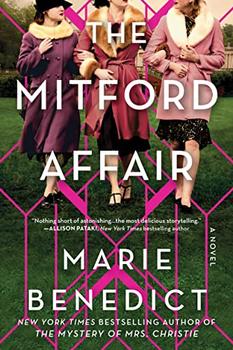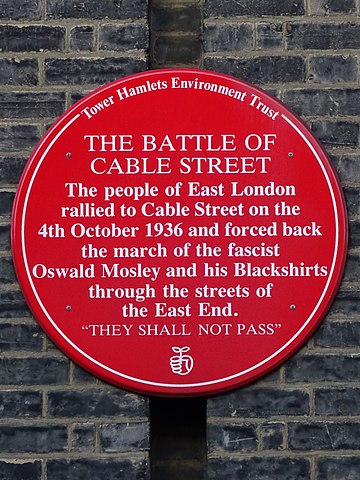Summary | Excerpt | Reading Guide | Discuss | Reviews | Beyond the Book | Read-Alikes | Genres & Themes | Author Bio

A Novel
by Marie BenedictThis article relates to The Mitford Affair
In Marie Benedict's historical novel The Mitford Affair, much of the narrative focuses on the rise of fascism in Great Britain before World War II.
Merriam-Webster defines fascism as "a political philosophy, movement, or regime…that exalts nation and often race above the individual and that stands for a centralized autocratic government headed by a dictatorial leader, severe economic and social regimentation, and forcible suppression of opposition." Today, in the context of WWII, most think primarily of fascism in Hitler's Germany or Mussolini's Italy, but in fact the movement had its advocates in other countries as well, including the United Kingdom and the United States.
The years after World War I saw massive social upheaval across the globe, and Great Britain was far from immune. The British Empire was crumbling, in large part due to a postwar rise in Indian nationalism and growing calls to end the crown's administration there. The nation's working classes, too, were inspired by the rise of socialism in other countries, such as the 1917 October Revolution in Russia, which promised a leveling of society, more equitable distribution of power and wealth, and more say in government policy. The British Parliament, elected and run by landowners until 1918, was forced to give the vote to working men and women out of concern they'd stage a revolution if not given more power.
Fearing an overthrow of the status quo, many in the upper echelons of power began to push for a return to conservative policies. This faction looked to Mussolini's successes in Italy, and as a result the British Fascisti (BF) was formed in 1923 — the country's first explicitly fascist political party. The BF mostly attracted support from ultra-conservatives; its membership was small, and its ideology wasn't well-defined. The BF consequently didn't have much pull and was considered a fringe group, mostly ignored by the press and public. Its different factions split off as they sought to influence the direction of fascism in Britain.
Mainstream acceptance of fascism began to grow in 1932, when Sir Oswald Mosley, Sixth Baronet of Ancoats, founded the British Union of Fascists (BUF). Extremely popular and charismatic, Mosley was one of the youngest individuals ever elected to parliament, where he served from 1918–1924. When he announced his formation of a new political party, it attracted the public's attention and, at first, a lot of support. Mosley's primary thrust was economic — the Great Depression was at its height and unemployment stood at over 22% — and Mosley advocated implementing strict economic reforms to restore the financial health of the nation. As the movement gained momentum, however, it began to lean farther and farther toward the policies espoused by Mussolini and Hitler, advocating nationalistic ideals, the silencing of opposing viewpoints (sometimes physically) and virulent antisemitism.
 It's believed that BUF had 50,000 members at its peak, but as it attracted more Nazi sympathizers it began to lose public support. Encounters with protesters became increasingly violent, culminating in the Battle of Cable Street on October 4, 1936, where up to 5,000 members of BUF staged a march through London's East End, inhabited by a sizeable Jewish population. A large number of counter-protesters met them (estimates range from 100,000 to over 300,000). BUF members were ultimately redirected away from the area by police and later claimed they were denied free speech.
It's believed that BUF had 50,000 members at its peak, but as it attracted more Nazi sympathizers it began to lose public support. Encounters with protesters became increasingly violent, culminating in the Battle of Cable Street on October 4, 1936, where up to 5,000 members of BUF staged a march through London's East End, inhabited by a sizeable Jewish population. A large number of counter-protesters met them (estimates range from 100,000 to over 300,000). BUF members were ultimately redirected away from the area by police and later claimed they were denied free speech.
BUF was never a pacifist organization, but it did advocate peace with Germany and Italy (the countries with whom its positions aligned). It lost its credibility when Britain declared war on Germany after Hitler invaded Poland in 1939, as the country largely coalesced around the war effort. In 1940, the British government passed Defense Regulation 18B, which allowed for the incarceration of those deemed a threat to national security. Mosley was interred until 1943, along with his wife, Diana Mitford, and about 1,000 of his followers.
Plaque commemorating the Battle of Cable Street at at 3-5 Dock Street, Whitechapel, London E1 8JN, courtesy of Open Plaques
Filed under Society and Politics
![]() This "beyond the book article" relates to The Mitford Affair. It originally ran in February 2023 and has been updated for the
September 2023 paperback edition.
Go to magazine.
This "beyond the book article" relates to The Mitford Affair. It originally ran in February 2023 and has been updated for the
September 2023 paperback edition.
Go to magazine.
Your guide toexceptional books
BookBrowse seeks out and recommends the best in contemporary fiction and nonfiction—books that not only engage and entertain but also deepen our understanding of ourselves and the world around us.